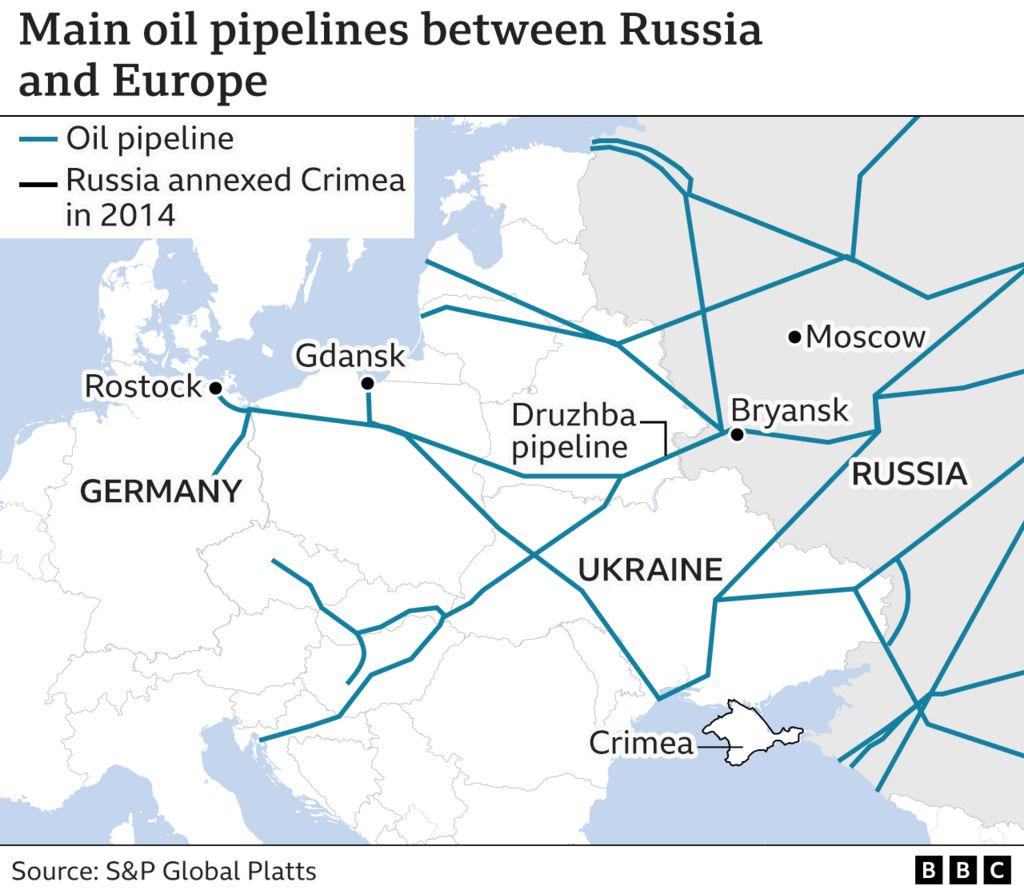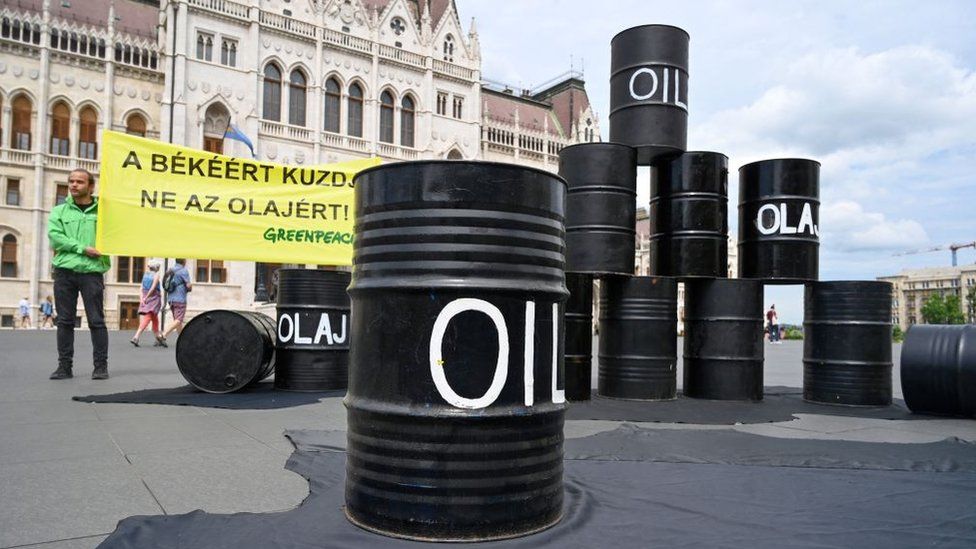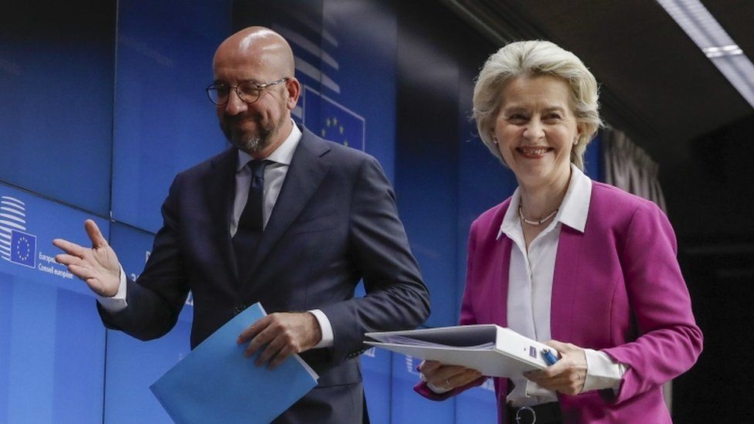European Union leaders have agreed on a plan to block more than two-thirds of Russian oil imports.
The ban is a compromise that will not affect pipeline oil imports for now, following opposition from Hungary.
European Council chief Charles Michel said the deal cut off "a huge source of financing" for the Russian war machine.
It is part of a sixth package of sanctions approved at a summit in Brussels, which all 27 member states have had to agree on.
Mr Michel said the EU had also agreed hard-hitting measures targeting Russia's largest bank, Sberbank, and three state-owned broadcasters.
EU members spent hours struggling to resolve their differences over the ban on Russian oil imports, with Hungary its main opponent.
The compromise followed weeks of wrangling until it was agreed there would be "a temporary exemption for oil that comes through pipelines to the EU", Mr Michel told reporters.
Because of this, the immediate sanctions will affect only Russian oil being transported into the EU over sea - two-thirds of the total imported from Russia.
I welcome the #EUCO agreement tonight on oil sanctions against Russia.
This will effectively cut around 90% of oil imports from Russia to the EU by the end of the year.— Ursula von der Leyen (@vonderleyen) May 30, 2022
But in practice, European Commission President Ursula von der Leyen said the scope of the ban would be wider, because Germany and Poland have volunteered to wind down their own pipeline imports by the end of this year.
"Left over is around 10-11% that is covered by the southern Druzhba," Ms Von der Leyen said, referring to the Russian pipeline supplying oil to Hungary, Slovakia and the Czech Republic.
The European Council will revisit this exemption "as soon as possible", she added.

The ban on Russian oil imports was initially proposed by the European Commission - which develops laws for member states - a month ago.
But resistance, notably from Hungary, which imports 65% of its oil from Russia through pipelines, held up the EU's troubled latest round of sanctions.
Other landlocked countries, such as Slovakia and the Czech Republic, also asked for more time due to their dependence on Russian oil. Bulgaria, already cut off from Russian gas by Gazprom, had likewise sought opt-outs.
The cost of living crisis being felt across Europe has not helped either. Sky-rocketing energy prices - among other things - have curtailed some EU countries' appetite for sanctions which could also hurt their own economies.

Hungarian Prime Minister Viktor Orban maintained a tough stance during the talks, blaming the European Commission for failing to properly negotiate the ban with member countries.
He said that energy was a "serious issue" and that "we need solutions and then the sanctions".
Ukraine's President Volodymyr Zelensky, who dialled into the summit, urged EU countries to stop their internal "quarrels," stating that they only helped Moscow.
"All quarrels in Europe must end, internal disputes that only encourage Russia to put more and more pressure on you," Mr Zelensky said via video-link.
"It is time for you to be not separate, not fragments, but one whole," he said.
Latvia's Prime Minister Krisjanis Karins said member countries should not get "bogged down" in their own personal interests.
"It's going to cost us more. But it's only money. The Ukrainians are paying with their lives," he said.
In other developments:
- There is fierce fighting in Ukraine's east, focused around the city of Severdonetsk
- According to the regional governor Serhyi Haidai, the "situation is very difficult" with no water, gas or electricity supplies in the city
- French journalist Frédéric Leclerc-Imhoff was killed covering an evacuation operation for broadcaster BFMTV near the city
- Russia's foreign minister, Sergei Lavrov, told French TV channel TF1 that the "liberation" of the eastern region known as the Donbas was an "unconditional priority" for Russia
- Ukraine launched a counter-offensive in a bid to reclaim land taken by Russia around the southern city of Kherson, according to Ukraine's military
- The US said it will not send weapons to Ukraine that can hit targets inside Russia, President Joe Biden said
Latest Stories
-
Unilever Ghana launches affordable ‘Comfort’ sachet fabric conditioner
26 minutes -
“Ghana is not just an anarchic state, it’s a vampire state”- Prof Aning on missing ECG containers
26 minutes -
Goldbod must focus on how to ensure compliance – Dr Stephen Ackah
46 minutes -
Sammy Gyamfi calls for urgent investigation into missing containers, commends Energy Minister for transparency
2 hours -
‘This is a clear organised crime’ – Victoria Bright on missing ECG containers
2 hours -
Presidency gagging relevant institutions from probing aircraft case suggests cover-up – Ntim Forjour claims
2 hours -
US tariffs pose significant risk to global economic outlook – IMF
2 hours -
Regional Collaboration and Standards – Policy recommendations for coordinated biofuel development in West and East Africa
2 hours -
US tariffs raise US recession risks, threaten global economic outlook – Fitch
2 hours -
TPTI holds 8th graduation, MCA graduates urged to pursue excellence
3 hours -
ECG containers not missing, officials must account for them – Kofi Bentil
3 hours -
Kwakye Ofosu’s response about suspicious flights not credible – Ntim Fordjour
3 hours -
Police investigate shooting incident at Adventist SHS in Kumasi
3 hours -
Ghana Sports Conference set for July 31
3 hours -
Rev Ntim Fordjour must be arrested to substantiate claims – Sammy Gyamfi
3 hours

